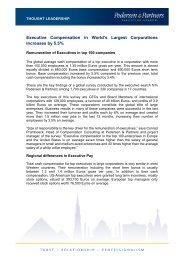'Executive search firms distinct from recruitment outfits' - Pedersen ...
'Executive search firms distinct from recruitment outfits' - Pedersen ...
'Executive search firms distinct from recruitment outfits' - Pedersen ...
Create successful ePaper yourself
Turn your PDF publications into a flip-book with our unique Google optimized e-Paper software.
‘Executive <strong>search</strong> <strong>firms</strong> <strong>distinct</strong> <strong>from</strong> <strong>recruitment</strong> outfits’Written by PHILIP OKAFORTuesday, 28 June 2011 00:00Because there is no exclusivity to the arrangement, the client company is free to use other<strong>search</strong> <strong>firms</strong> or source other candidates on their own pari-passu the ES process. This raises theissue of whether the <strong>search</strong> firm actually has such a ‘client’ in the first place, given the absenceof any stated or written commitments for exclusivity and explains why contingency <strong>search</strong>es areoften given less energy by recruiting professionals because of the increased risk of no return oninvested energy and resources.Are there different types of executive <strong>search</strong> <strong>firms</strong>?There are broadly two different types of Retained Executive <strong>search</strong> <strong>firms</strong> in operation. Global:These tend to cover numerous different sectors, including financial services, life sciences,automotive, consumer, energy, pharmaceutical, telecommunications, technology, and mediacompanies, as well as other industries. Such executive <strong>search</strong> companies will have manyoffices all over the world and the consultants will typically be split by which sector they areexpert in. These <strong>firms</strong> are often, but not always, public listed and may have well over 40 officesin each country of operation globally. <strong>Pedersen</strong> and Partners comes under this category.There is the Boutique type. These tend to be more sector-specific. That is to say that they willcover only one sector and within this sector, they may only look at certain aspects. For instance,there are a number of boutique <strong>firms</strong> that operate within financial services and these companiestend to look at senior positions (MD, Director and Vice-President) within Investment Banking(M&A, Corporate Finance), Capital Markets (ECM & DCM), Sales, Trading, Re<strong>search</strong>, InterestRates, Credit, Equities, Derivatives, hedge funds and long-only asset management. As such,these <strong>firms</strong> would have one or more offices in the major financial centres across the globe;London, New York, Chicago, Dubai, Shanghai, Beijing, Mumbai, Hong Kong, Tokyo andSingapore, etc.Difference between executive <strong>search</strong> and <strong>recruitment</strong> <strong>firms</strong>Good retained executive <strong>search</strong> <strong>firms</strong> act as consultants on behalf of companies to findnon-active (passive & hidden) candidates, qualify them, present to client, and oversee theselection process to ensure the right fit. Generally, <strong>recruitment</strong> agencies deal with activejob-seekers and source their candidates through adverts, job websites and word of mouth.Executive <strong>search</strong> companies will typically work with a retainer/upfront fee basis, while<strong>recruitment</strong> agencies will often work on a ‘no cure no pay basis’ or ‘success-based’ model.2 / 5
‘Executive <strong>search</strong> <strong>firms</strong> <strong>distinct</strong> <strong>from</strong> <strong>recruitment</strong> outfits’Written by PHILIP OKAFORTuesday, 28 June 2011 00:00Executive <strong>search</strong> companies tend to work on an exclusivity basis, i.e. ES <strong>firms</strong> work as the onlyfirm contractually allowed to fill the position in question for a defined period, while anassignment <strong>from</strong> a <strong>recruitment</strong> agency will often be handled by several competing agencies atthe same time.Executive <strong>search</strong> companies focus largely on Senior / Executive roles (though insistence onexecutive management roles alone is watering down to middle management in many ES <strong>firms</strong>).Recruitment agencies tend to handle any level they can get and especially favor mass<strong>recruitment</strong>s.While executive <strong>search</strong> <strong>firms</strong> are re<strong>search</strong>-based and will tend to map organisations whilemaintaining and updating databases, <strong>recruitment</strong> agencies tend to target professionals onlyafter they have secured a brief to fill a specific position.There are some who are of the view that executive <strong>search</strong> is a more mature and polished stagein the organisational life cycle of <strong>firms</strong> in the <strong>recruitment</strong> and selection business. Recruitment<strong>firms</strong>, according to that school of thought, as they thrive and grow will gravitate to becomeES-type <strong>firms</strong>.Organisations employing the services of executive <strong>search</strong> <strong>firms</strong>Access to candidates who are not in the job market: ES <strong>firms</strong> are typically branded andpositioned at the top end of the business ‘food-chain’ and as such, <strong>firms</strong> are better preparedand able to go directly to potential candidates (especially at the senior level) who are successfulin their careers and may not be thinking of moving jobs.Experience dealing with senior executives: ES <strong>firms</strong> usually have years of experience assessingthe skills, experience and backgrounds of senior executives and are therefore able to bestmatch the needs of the client organisations. This professional familiarity allows for sensitivity tothe nuances, not only the obvious. In addition, experience and training enable consultants askprobing, thoughtful questions and effectively evaluate the candidates’ answers.Confidentiality: Searching for senior-level personnel usually requires a high level ofconfidentiality because, in many instances, there is an incumbent in the role the client firm istrying to fill. Care and discretion are the stock in trade of ES <strong>firms</strong> to ensure that the hiring3 / 5
‘Executive <strong>search</strong> <strong>firms</strong> <strong>distinct</strong> <strong>from</strong> <strong>recruitment</strong> outfits’Written by PHILIP OKAFORTuesday, 28 June 2011 00:00organisation is not in any way disrupted by the <strong>search</strong> process. Focus: One of the mostcompelling reasons for organisations to use an ES firm is to focus their <strong>recruitment</strong> resourceson just decision making. The ES firm will assume all the many logistics of a <strong>search</strong> process andpresent the client with a short-list of what will typically be the most qualified candidate for therole within (or beyond ) the client organisation’s geography.Process of selecting the best candidates for clientsIn order to be able to offer this value added service, ES companies approach each <strong>recruitment</strong>case as a totally new project, not relying on past <strong>search</strong>es. While certain know-how isaccumulated <strong>from</strong> past experiences, the market changes enough to warrant a fresh approacheach time, never assuming too much. In order for the project to be successful, it is necessaryfor the client and the ES consultant to have a symbiotic relationship based on trust: they arepartners for the duration of the project. First of all, detailed planning needs to be carried out,defining the business need and the context of the <strong>search</strong>.During this phase, it is advisable the client disclose all relevant facts to the ES consultant, asdetails can often make the difference – what is the business objective of the position? Why isthe manager being replaced? Are there internal candidates for the position? How many personswill be involved in the final decisions and who are they? The questions are many and should allbe answered prior to the start. This phase should result in a clear definition of the role and thecandidate profile, referred to as the brief. Also, a <strong>search</strong> plan should be drawn up, defining whothe <strong>search</strong> will target, the timing, key event during the project, the roles of the client and the ESCompany, etc.Once the <strong>search</strong> has started, it is usual that the ES consultant and their re<strong>search</strong>er first consulttheir database of past candidates, ascertaining if based on past <strong>search</strong>es, they can partly definewho they wish to contact and who not. It should be pointed out, however, that in the ESprocess, the database is only one of the tools and should not be treated as more than that. Thequality of this tool, however, can greatly influence its usefulness. A large part of the work nowconsists of defining the list of companies to <strong>search</strong> in, taking care to remove <strong>from</strong> that list anycompanies that are off-limits, whether because they are clients of the ES Company or becauseof a business relationship with the client.Within the target companies, the re<strong>search</strong>er will identify and screen potential candidates basedon their current roles. Simultaneously, the consultant will go through a network of contacts,asking for recommendations and tips for candidates – this can often bear fruit and is a reliablesource. At this stage, it is usual that the ES Company does not disclose the name of the client –this is left until after interviews and generally only to candidates that are considered for theshort-list.Once the client has carried out all the interviews, and has chosen the candidate that suits thembest, the ES consultant’s job is not done. A skilled and experienced consultant will be of4 / 5
‘Executive <strong>search</strong> <strong>firms</strong> <strong>distinct</strong> <strong>from</strong> <strong>recruitment</strong> outfits’Written by PHILIP OKAFORTuesday, 28 June 2011 00:00valuable assistance even during contract negotiation and final discussion between the clientand the candidate, acting as an independent third party, conducting further formal referencechecks, and generally following the process closely to ensure it ends successfully. It should benoted that not all clients like to see this close involvement of the consultant at this stage; it is ofcourse a matter of opinion if the client is then not taking full benefit of the service.Even after the candidate has signed on, the ES consultant’s role in this hiring does not end. Dueto notice period and a possible hand-over, there can be a period of several months between thedate when the client and the candidate agreed on the contract and the physical start day. Fromexperience, even this is a time when things can go wrong, so the consultant will keep in regulartouch with the candidate to ensure that all is in order and to catch any issues early, should theyarise. After the candidate’s start date, it is wise to continue the follow-up, keeping in contact withthe client and the candidate, following the integrations and progress, and being ready tomediate and advise if need be.5 / 5









